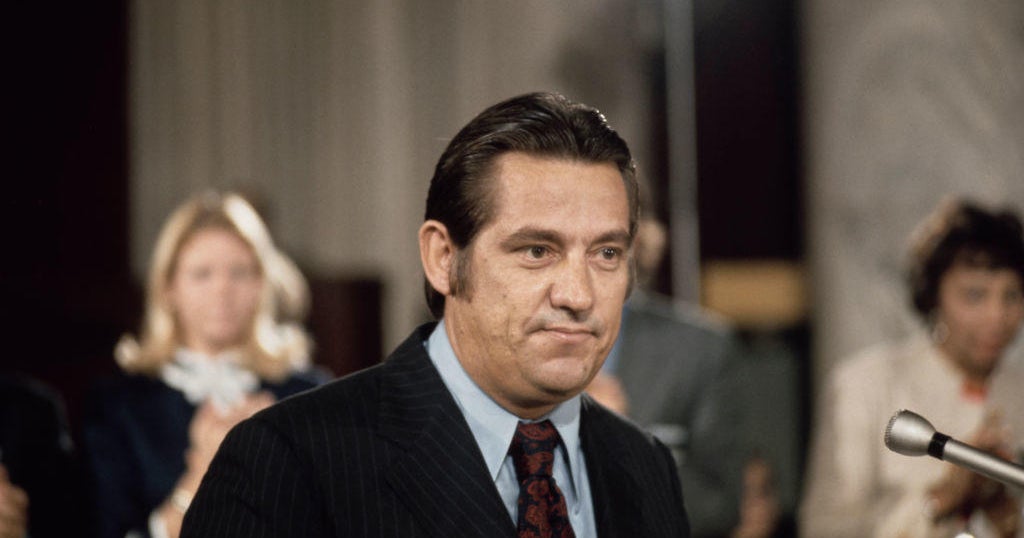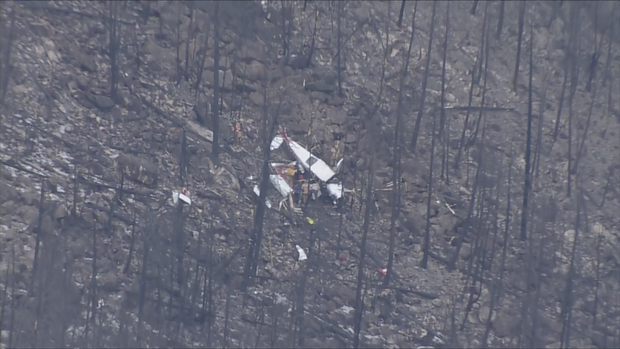CBS News
Paraguay finally has a sex ed curriculum, but many worry about the lessons on offer

Asunción, Paraguay — Ahead of her 15th birthday, Diana Zalazar’s body had gotten so big she could no longer squeeze into the dress she bought for her quinceañera to celebrate her passage into womanhood in Paraguay.
Her mother sought help from a doctor, who suspected that growing inside of the 14-year-old Catholic choir girl could be a giant tumor. Next thing Zalazar knew, a gynecologist was wiping down the probe she’d applied to her belly and informing her that she was in her sixth month of pregnancy.
It made no sense to Zalazar, who had recently had sex for the first time without realizing it could make her pregnant.
In Catholic Paraguay, which has the highest rate of teenage pregnancy in South America, many young mothers explained their teen pregnancies to The Associated Press as the result of growing up in a country where parents avoid the birds and the bees talk at all costs and national sex education is indistinguishable from a hygiene lesson.
“I didn’t decide to become a mother,” Zalazar said. “I didn’t have a chance to choose because I didn’t have the knowledge.”
Over the years that Zalazar, now 39, has gone from sexual ignorance and shame to raising her 23-year-old son and advocating for children’s rights, Paraguay’s lack of sex education has remained unchanged — until now. For the first time, the Ministry of Education has endorsed a national sex ed curriculum. But in a surprising twist, it’s the sexual health educators and feminists who are panicked. Conservative lobbyists are thrilled.
The curriculum, a copy of which was obtained by the AP, promotes abstinence, explains sex as “God’s invention for married people,” warns about the inefficacy of condoms and says nothing of sexual orientation or identity.
Jorge Saenz/AP
“We have a very strong Judeo-Christian culture that still prevails, and there’s fierce resistance to anything that goes against our principles,” said Miguel Ortigoza, a key proponent of the curriculum and evangelical pastor from Capitol Ministries, a Washington-based nonprofit that ran Bible study for former President Donald Trump’s Cabinet.
As a new generation of activists campaigning for legal abortion and gay rights scores victories across Latin America, a conservative backlash has gathered in Paraguay. The country already has among the world’s strictest abortion laws — punishable by prison time even in cases of incest or rape, though not when the mother’s life is in danger.
“Laws everywhere now allow girls to kill their babies, but Paraguay is among the remaining few saying no for Jesus’ sake,” said Oscar Avila, manager of an anti-abortion shelter for young mothers in Paraguay’s capital. At a recent morning Mass, girls no older than 15 filled the pews, some heavily pregnant, others with infants on their hips.
Critics explain the outsized power of Paraguay’s right-wing pressure groups as the consequence of a peculiar history. The conservative Colorado party has ruled the country for 76 of the past 80 years — including during a dictatorship openly sympathetic to Adolf Hitler.
“Growing up under the dictatorship, I was told homosexuality is a deviation,” said Simón Cazal, founder of Paraguayan LGBTQ+ rights group SomosGay. “The dictatorship legally ended, but the same political clans kept running the show.”
More recently, the rise of the far right in Latin America has given the governing party’s platform of religion, family and “patria,” or fatherland, newer resonance — emboldening conservative culture warriors with evangelical ties to take their battles to classrooms.
In 2017, Paraguay became the first country to ban school discussions about gender identity, an unwitting trailblazer for European populists and Republican governors. Now its sex ed curriculum has become a national flashpoint.
“The text is very dangerous, it’s an affront to science,” leftist Sen. Esperanza Martínez told a government committee recently convened to debate the curriculum.
Education Minister Luis Fernando Ramirez downplayed the controversy, stressing there was still time to improve the curriculum before enforcing it. “There’s no expenditure of state funds,” he told lawmakers. “Let’s not pass judgement until we do deeper work.”
Authorities assembled teams to revise the curriculum, called “12 Sciences of Sexuality and Affectivity Education,” which it plans to pilot in September across five eastern regions before taking it nationwide. Parents’ rights groups praise the 12 books, one for each grade, as a way of teaching morals and protecting young people.
“It’s a real battle for life, family, the true rights of children and the freedom of parents,” said curriculum author Maria Judith Turriaga. “It’s the reason parents fought for it to be included in public schools.”
The curriculum instructs children to treat others with respect and cultivate healthy relationships.
But in discouraging contraception and enforcing traditional gender norms, it has become a lightning rod for social tensions. Critics say it perpetuates sexist stereotypes: “Men conquer, not seduce,” “girls have smaller and lighter brains,” “boys don’t cry easily,” “girls don’t like taking risks.”
Masturbation, it says, causes “frustration and isolation.” Marital love lasts forever. Girls should beware of “how their way of dressing makes men behave.” Female puberty is “the body preparing to become a wife and mother.”
The books are filled with unexpected claims, too – “Boys do not clearly perceive high-pitched voices,” it says.
Any talk of sex is about the heterosexual variety.
“Without a truly inclusive education that allows you to understand your reality, it’s scary,” said Yren Rotela, a trans activist whose identity as female at 13 pushed her into indentured servitude and sex work in a country where transgender identity is not legally recognized, there’s no legislation recognizing hate crimes and discrimination is widespread.
At a workshop in August, participants voiced alarm over parts of the curriculum emphasizing the duty of obedience to parents and authorities and urging pregnant teens to confide in their families – even as sexual assault is typically perpetrated in the home.
“I never got help from my family, they were threatening me not to tell anyone,” said Liliana, who was raped by her stepfather and became pregnant at 13, speaking on condition that only her first name be used because her case is under investigation.
The focus on unquestioned deference carries a political charge in Paraguay, where experts say Latin America’s longest-ruling dictatorship instilled an enduring autocratic tradition.
“It’s easy in this country to create authoritarian projects that play on people’s fears,” said Adriana Closs, president of Feipar, a Paraguayan group promoting comprehensive education. “Political factions are taking advantage of this because of the favorable global context.”
As the politics of social conservatism surge from Brazil to Hungary, Paraguayan lawmakers have found immense promise in agitating against what they hold is a Western conspiracy to feminize boys and make girls gay.
Panic over foreign influence taps into collective trauma from the War of the Triple Alliance, which pitted Paraguay against Argentina, Brazil and Uruguay, and decimated more than half of its population. Paraguayans still have a habit of invoking the 1865-1870 conflict as if it happened last week.
“Paraguay is the perfect breeding ground for globalist conspiracies,” said Esteban Caballero, adviser for the Latin American Faculty of Social Sciences, a regional research group. “It’s not a fringe group of fanatics promoting this narrative, it’s a conservative society terrified by nonbinary identities. That means votes.”
Before 2023’s parliamentary elections, an annual transfer of European Union funds to Paraguay’s Education Ministry plunged politicians into a galvanizing battle.
Electoral debate pivoted from Paraguay’s rampant corruption and neglected schools to accusations that the EU indoctrinates children about “gender ideology” through its financing agreement, “Transforming Education.”
The Senate narrowly rejected a bill that swept through the lower house ordering authorities to repeal EU funds, which in reality support anti-hunger initiatives.
As controversy swirled, European diplomats held a ceremony to change the agreement’s name to “Strengthening Education” for fear the word “transforming” caused offense. President Santiago Peña appeared at Paraguay’s biggest evangelical church, promising religious leaders increased influence over the national educational agenda.
“We see stronger support than in previous times,” Pastor Ortigoza said. “There’s greater sensitivity to our causes.”
CBS News
2 killed in U.S. Civil Air Patrol plane crash near Palisade Mountain in Northern Colorado

Two people were killed and a third was injured when a U.S. Civil Air Patrol plane crashed in Colorado’s Front Range Saturday morning.
The small passenger plane with three people aboard crashed near Storm Mountain and Palisade Mountain west of Loveland around 11:15 a.m., according to the Larimer County Sheriff’s Office. The plane belonged to the Civil Air Patrol, the civilian auxiliary wing of the U.S. Air Force, and was on a routine aerial photography training mission when it went down, officials said.
Pilot Susan Wolber and aerial photographer Jay Rhoten were identified by CAP as those killed and co-pilot Randall Settergren was identified as the person injured. Settergren was airlifted to an area hospital by a National Guard helicopter, where he is undergoing medical care.
CBS
“The volunteers of Civil Air Patrol are a valuable part of the Department of Military and Veterans Affairs, and the lifesaving work they do on a daily basis directly contributes to the public safety of Coloradans throughout the state,” Maj. Gen. Laura Clellan, adjutant general of the Colorado Department of Military and Veterans Affairs, said in a statement Saturday.
“We are devastated to hear of the loss of Susan Wolber and Jay Rhoten, and the injury of Randall Settergren, during a training mission in Larimer County. Our thoughts and deepest condolences are with the families of those involved in the crash,” Clellan continued. “I would also like to thank all of the first responders who assisted with rescue efforts.”
Palisade Mountain is in Larimer County, about 20 miles west of Loveland and about 65 miles northwest of Denver. The area is part of the burn scar of the Alexander Mountain Fire, which burned almost 10,000 acres in over two weeks this past summer.
The crash happened about 200 feet below the summit of Palisade Mountain in an area that includes tall trees and steep hills as part of the mountain range. Rescue crews were heard on radio traffic working to find a landing zone for rescue helicopters. No structures were impacted by the crash.
The plane crashed in “very rugged” and “extensive and rocky terrain,” Ali Adams, a Larimer County Sheriff’s Office spokeswoman, said at a news conference. First responders had to hike out to the site and the sole survivor was “severely injured” when responders finally got to them.
Rescue efforts were ongoing at 3:15 p.m., according to Adams, and recovery efforts for the two deceased people’s bodies could take several days.
Several agencies responded, including the Loveland Fire Rescue Authority, Thompson Valley EMS and the National Guard.
The Larimer County Sheriff’s Office is the lead agency investigating the crash and the Federal Aviation Administration and National Transportation Safety Board will assist, according to Adams. The NTSB said it too was investigating the crash and identified the plane as a Cessna 182.
“This is one of those incidents that is really low frequency; it doesn’t happen really often, but unfortunately, our first responders have had more than their fair share of responses,” Adams said.
George Solheim lives in the area of the crash. He described conditions as “extremely windy” on Saturday and heard the plane just prior to the crash. He says he could hear “loud ‘throttle up/down’ immediately prior to sudden silence at (the) time of (the) crash. Couldn’t hear sounds of impact from here.”
Colorado Gov. Jared Polis extended his sympathy to the families of the victims in a statement Saturday evening:
“I’m saddened to hear of the loss of two dedicated Civil Air Patrol members, Pilot Susan Wolber and aerial photographer Jay Rhoten, who lost their lives in today’s crash and my thoughts are with their families, friends and colleagues. These individuals, along with survivor co-pilot Randall Settergren, who was injured, served the Civil Air Patrol as volunteers who wanted to help make Colorado a better, safer place for all. The State of Colorado is grateful for their commitment to service and it will not be forgotten. I also want to thank the first responders who assisted with the rescue and recovery efforts.”
CBS News
Fred Harris, former Democratic U.S. senator and presidential candidate, dies at 94

Fred Harris, a former U.S. senator from Oklahoma, presidential hopeful and populist who championed Democratic Party reforms in the turbulent 1960s, died Saturday. He was 94.
Harris’ wife, Margaret Elliston, confirmed his death to The Associated Press. He had lived in New Mexico since 1976.
“Fred Harris passed peacefully early this morning of natural causes. He was 94. He was a wonderful and beloved man. His memory is a blessing,” Elliston said in a text message.
Bettmann Archive/Getty Images
Harris served eight years in the Senate, first winning in 1964 to fill a vacancy, and made unsuccessful bid for the presidency in 1976.
“I am deeply saddened to learn of the passing of my longtime friend Fred Harris today,” Democratic New Mexico Gov. Michelle Lujan Grisham wrote in a post to social media. “Harris was a towering presence in politics and in academia, and his work over many decades improved New Mexico and the nation. He will be greatly missed.”
Democratic Sen. Martin Heinrich of New Mexico said in a statement that “New Mexico and our nation have lost a giant,” describing him as a “tireless champion of civil rights, tribal sovereignty and working families.”
It fell to Harris, as chairman of the Democratic National Committee in 1969 and 1970, to help heal the party’s wounds from the tumultuous national convention in 1968 when protesters and police clashed in Chicago.
He ushered in rule changes that led to more women and minorities as convention delegates and in leadership positions.
“I think it’s worked wonderfully,” Harris recalled in 2004, when he was a delegate to the Democratic National Convention in Boston. “It’s made the selection much more legitimate and democratic.”
“The Democratic Party was not democratic, and many of the delegations were pretty much boss-controlled or -dominated. And in the South, there was terrible discrimination against African Americans,” he said.
Harris ran unsuccessfully for the Democratic presidential nomination in 1976, quitting after poor showings in early contests, including a fourth-place win in New Hampshire. The more moderate Jimmy Carter went on to win the presidency.
Harris moved to New Mexico that year and became a political science professor at the University of New Mexico. He wrote and edited more than a dozen books, mostly on politics and Congress. In 1999 he broadened his writings with a mystery set in Depression-era Oklahoma.
Throughout his political career, Harris was a leading liberal voice for civil rights and anti-poverty programs to help minorities and the disadvantaged. Along with his first wife, LaDonna, a Comanche, he also was active in Native American issues.
“I’ve always called myself a populist or progressive,” Harris said in a 1998 interview. “I’m against concentrated power. I don’t like the power of money in politics. I think we ought to have programs for the middle class and working class.”
“Today ‘populism’ is often a dirty word because of how certain leaders wield power,” Heinrich said in his statement Saturday. “But Fred represented a different brand of populism — one that was never mean or exclusionary. Instead, Fred focused his work and attention on regular people who are often overlooked by the political class.”
Harris was a member of the National Advisory Commission on Civil Disorders, the so-called Kerner Commission, appointed by then-President Lyndon Johnson to investigate the urban riots of the late 1960s.
The commission’s groundbreaking report in 1968 declared, “our nation is moving toward two societies, one black, one white — separate and unequal.”
Thirty years later, Harris co-wrote a report that concluded the commission’s “prophecy has come to pass.”
“The rich are getting richer, the poor are getting poorer and minorities are suffering disproportionately,” said the report by Harris and Lynn A. Curtis, president of the Milton S. Eisenhower Foundation, which continued the work of the commission.
Norman Ornstein of the American Enterprise Institute said Harris rose to prominence in Congress as a “fiery populist.”
“That resonates with people…the notion of the average person against the elite,” Ornstein said. “Fred Harris had a real ability to articulate those concerns, particularly of the downtrodden.”
In 1968, Harris served as co-chairman of the presidential campaign of then-Vice President Hubert Humphrey. He and others pressed Humphrey to use the convention to break with Johnson on the Vietnam War. But Humphrey waited to do so until late in the campaign, and narrowly lost to Republican Richard Nixon.
“That was the worst year of my life, ’68. We had Dr. Martin Luther King killed. We had my Senate seatmate Robert Kennedy killed and then we had this terrible convention,” Harris said in 1996.
“I left the convention — because of the terrible disorders and the way they had been handled and the failure to adopt a new peace platform — really downhearted.”
After assuming the Democratic Party leadership post, Harris appointed commissions that recommended reforms in the procedures for selecting delegates and presidential nominees. While lauding the greater openness and diversity, he said there had been a side effect: “It’s much to the good. But the one result of it is that conventions today are ratifying conventions. So it’s hard to make them interesting.”
“My own thought is they ought to be shortened to a couple of days. But they are still worth having, I think, as a way to adopt a platform, as a kind of pep rally, as a way to get people together in a kind of coalition-building,” he said.
Harris was born Nov. 13, 1930, in a two-room farmhouse near Walters, in southwestern Oklahoma, about 15 miles from the Texas line. The home had no electricity, indoor toilet or running water.
At age 5 he was working on the farm and received 10 cents a day to drive a horse in circles to supply power for a hay bailer.
He worked part-time as a janitor and printer’s assistant to help for his education at University of Oklahoma. He earned a bachelor’s degree in 1952, majoring in political science and history. He received a law degree from the University of Oklahoma in 1954, and then moved to Lawton to practice.
In 1956, he won election to the Oklahoma state Senate and served for eight years. In 1964, he launched his career in national politics in the race to replace Sen. Robert S. Kerr, who died in January 1963.
Harris won the Democratic nomination in a runoff election against J. Howard Edmondson, who left the governorship to fill Kerr’s vacancy until the next election. In the general election, Harris defeated an Oklahoma sports legend — Charles “Bud” Wilkinson, who had coached OU football for 17 years.
Harris won a six-year term in 1966 but left the Senate in 1972 when there were doubts that he, as a left-leaning Democrat, could win reelection.
Harris married his high school sweetheart, LaDonna Vita Crawford, in 1949, and had three children, Kathryn, Byron and Laura. After the couple divorced, Harris married Margaret Elliston in 1983. A complete list of survivors was not immediately available Saturday.
CBS News
Compromise deal reached at COP29 climate talks for $300 billion a year to poor nations

Countries agreed on a deal to inject at least $300 billion annually in humanity’s fight against climate change, aimed at helping poor nations cope with the ravages of global warming at tense United Nations climate talks in the city where industry first tapped oil.
The $300 billion will go to developing countries who need the cash to wean themselves off the coal, oil and gas that causes the globe to overheat, adapt to future warming and pay for the damage caused by climate change’s extreme weather. It’s not near the full amount of $1.3 trillion that developing countries were asking for, but it’s three times the $100 billion a year deal from 2009 that is expiring. Delegations said this deal is headed in the right direction, with hopes that more money flows in the future.
“Everybody is committed to having an agreement,” Fiji delegation chief Biman Prasad said as the deal was being finalized. “They are not necessarily happy about everything, but the bottom line is everybody wants a good agreement.”
It’s also a critical step toward helping countries on the receiving end create more ambitious targets to limit or cut emissions of heat-trapping gases that are due early next year. It’s part of the plan to keep cutting pollution with new targets every five years, which the world agreed to at the U.N. talks in Paris in 2015.
The Paris agreement set the system of regular ratcheting up climate fighting ambition as away to keep warming under 1.5 degrees Celsius above pre-industrial levels. The world is already at 1.3 degrees Celsius and carbon emissions keep rising.
Countries also anticipate that this deal will send signals that help drive funding from other sources, like multilateral development banks and private sources. That was always part of the discussion at these talks — rich countries didn’t think it was realistic to only rely on public funding sources — but poor countries worried that if the money came in loans instead of grants, it would send them sliding further backward into debt that they already struggle with.
“The $300 billion goal is not enough, but is an important down payment toward a safer, more equitable future,” said World Resources Institute President Ani Dasgupta. “This deal gets us off the starting block. Now the race is on to raise much more climate finance from a range of public and private sources, putting the whole financial system to work behind developing countries’ transitions.”
It’s more than the $250 billion that was on the table in the first draft of the text, which outraged many countries and led to a period of frustration and stalling over the final hours of the summit. After an initial proposal of $250 billion a year was soundly rejected, the Azerbaijan presidency brewed up a new rough draft of $300 billion, that was never formally presented, but also dismissed roundly by African nations and small island states, according to messages relayed from inside.
The several different texts adopted early Sunday morning included a vague but not specific reference to last year’s Global Stocktake approved in Dubai. Last year there was a battle about first-of-its-kind language on getting rid of the oil, coal and natural gas, but instead it called for a transition away from fossil fuels. The latest talks only referred to the Dubai deal, but did not explicitly repeat the call for a transition away from fossil fuels.
Countries also agreed on the adoption of Article 6, creating markets to trade carbon pollution rights, an idea that was set up as part of the 2015 Paris Agreement to help nations work together to reduce climate-causing pollution. Part of that was a system of carbon credits, allowing nations to put planet-warming gasses in the air if they offset emissions elsewhere. Supporters said a U.N.-backed market could generate up to an additional $250 billion a year in climate financial aid.
Despite its approval, carbon markets remain a contentious plan because many experts say the new rules adopted don’t prevent misuse, don’t work and give big polluters an excuse to continue spewing emissions.
“What they’ve done essentially is undermine the mandate to try to reach 1.5,” said Tamara Gilbertson, climate justice program coordinator with the Indigenous Environmental Network. Greenpeace’s An Lambrechts, called it a “climate scam” with many loopholes.
With this deal wrapped up as crews dismantle the temporary venue, many have eyes on next year’s climate talks in Belem, Brazil.










